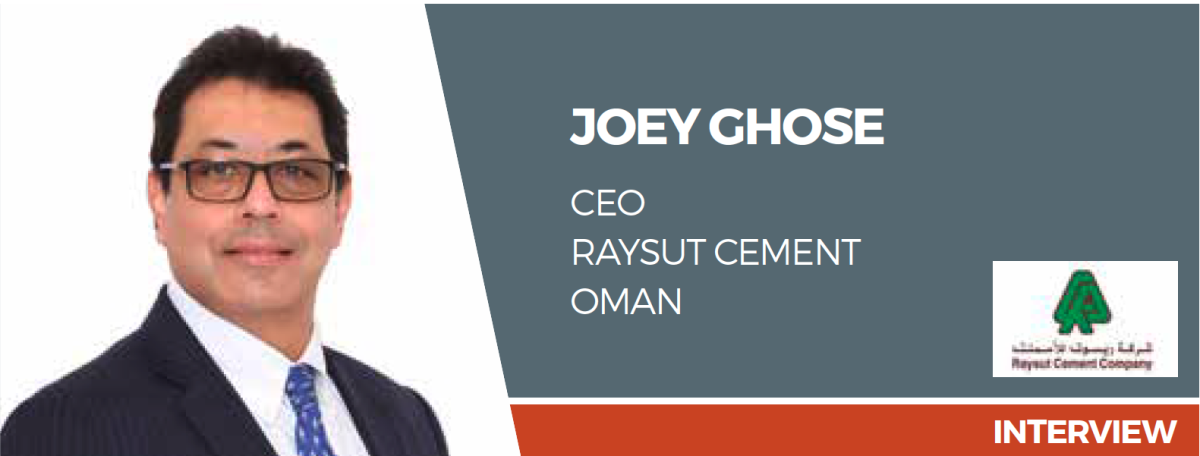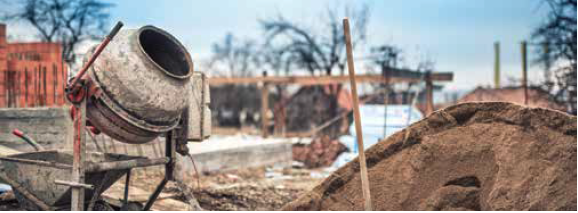
ON SUSTAINING AND GROWING IN UNUSUAL TIMES
What has the Covid-19 impact been on the cement production industry? What are the short- and longterm challenges, and how do you believe they will be overcome?
What has the Covid-19 impact been on the cement production industry? What are the short- and longterm challenges, and how do you believe they will be overcome?
When Covid-19 hit us, our business suffered a huge loss in the first two quarters of 2020, primarily because we are 50% export-orientated. We could not export to our customers, ranging from East and South Africa, to the Indian Ocean Islands, because most of the ports imposed quarantine and closures, which led to long delays.
Domestically, with most businesses going into lockdown, the local demand tapered off, and the savings that we had enjoyed over the last 5 years were wiped out in the first 2 months. Further to this, we were also impacted by the shortage of spare parts and other consumables. Raysut Cement operates on a Just-In-Time inventory model, where our suppliers provide us with spare parts as and when we need them, but when everything came to a standstill, we started re-looking at becoming more self-sufficient by keeping essential spare parts ourselves, outsourcing less, doing a lot more work in-house and sustainable cost-cutting to be able to survive unexpected situations.
We feel to survive and remain sustainable, we had to relook at the way we do business completely. At Raysut, we are leading this change by empowering our people more and ensuring that every business unit is self sufficient in the market in which it operates.

CURRENT OPPORTUNITIES
Besides Covid-19, what are the 2-3 macro-economic challenges that the cement and concrete production industry is facing globally?
The first challenge is that there is a massive oversupply in global cement production and, specifically, in the middle east where we operate. The Middle East has an overcapacity of 40 million tonnes per annum, driven mainly by the UAE and Saudi Arabia. These two countries built a lot of capacity in the boom years of the 2000s when infrastructure was developed in these markets, which is now pouring into the region. Adding to that, we have a lot of unrest in the region where markets like Yemen, Syria and Iraq are still in turmoil, so demand is not really visible anymore. Iran has a 100 million tonne capacity, but the economy is suffering with sanctions, so the only way they can get foreign exchange is by pushing out as much cement and clinker as they can, which is government-subsidised and is hitting the market at very low prices, which is not sustainable. It is important that governments consider this issue, which could lead to a complete collapse of vital industries in many geographies.
The second issue is globalisation, but as we saw in this pandemic, we are still very localised. I believe that it is now the duty of the governments to start creating some controls and adequate protection for what are considered critical industries for the survival of a country’s economy. These strategic industries cannot be subjected to global trends or oversupplies or other factors.
We are leading
this change by
empowering our
people more and
ensuring that every
business unit is
self-sufficient in the
market in which it
operates.
ON 4IR: THE NEXT REVOLUTION
How is the industry responding to the Fourth Industrial Revolution, in your view?
I think technology is going to play a big role, not only in the way we manufacture cement, but the way we manage the business. In the old days when I was a young engineer on the cement plant, I had to radio
everything to my manager, who then radioed back an instruction. Today we have a central control room, which is going to become much more sophisticated still. Automation will give us cleaner, better, more efficient
product and also enable us to tailor more products to the needs of the market. It is important to embrace new technology, not only for companies’ performance but for the environment as well. We have significantly reduced the environmental impact we have had historically. It’s very important for us here. We are modernising our plants and are looking at implementing real-time information systems, so employees
are empowered to take decisions for immediate corrective action, which will improve the way we work. In addition to that, I think it’s important that we grow in markets that need the industry, not only for the market
demand but also for the employment, for the betterment of the livelihoods of those populations. We at Raysut, for the past 30 years have been exporting about 50 000-60 000 tonnes of cement a month to
Somalia, and this year we have decided that we will build a plant there, which will create 400 direct jobs and will use 50% local materials. This is what the industrial revolution should look at – creating value in the market and creating jobs. That, to me, is sustainability and will keep your business running for the next 50 years.
ON REGIONAL FACTORS
What is the status quo of the cement and concrete production industry in Oman, and more broadly, the
Middle East?
There are two markets which are really disrupting the regional gameplay. We all understand that the region is not enjoying high oil prices anymore, and the Middle East is very much an oil-dependent region. With the
regional turmoil also causing stress in the economy, compounded with the fact that the UAE and Saudi Arabia have vast excess capacities, there is real pressure on the industry. This is filtered to the downstream industry,
where companies are fighting for market share and ultimately all losing money. Somewhere, and sometime soon, we require a high-level body to form a focused committee to bring some sanity and stability to the region.
China did a great job with this – 2001 to 2010 were boom years and 2010 to 2015 were disaster years because they had 100% overcapacity. The government then intervened and much of the capacity was removed, limiting plant size and technology, reducing pollution and inefficient capacities, enabling the industry to flourish..
In Oman, we are also facing the serious challenge of dumping from the UAE. We are negotiating with local governments to bring some sanity and control over this, as this causes additional stress to the cement industry.
What do you enjoy doing in your spare time, when you are not thinking about the cement production industry?
I enjoy motorsport very much. I have a collection of historic and classic cars dating back to the 60s and 70s. I participate in long endurance motor rallies, which span 3000 – 5000 kilometres, mainly in Africa. To survive
these endurance motor rallies, like the Classic Safari Rally, I have to remain fit, so I spend a lot of time in the gym. I also like sports, so whenever I get a chance, I go out and play tennis. I like to stay active; have a 10-12 hour working day but also a 4-hour relaxing day where I keep fit and prepare my cars to make sure they are ready for the next event.

